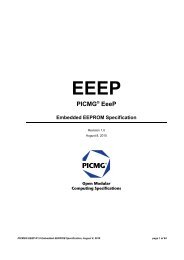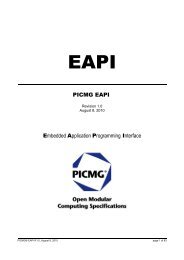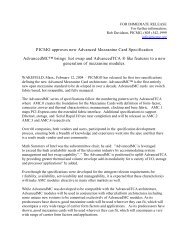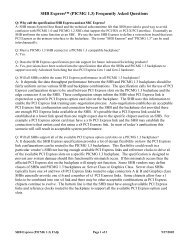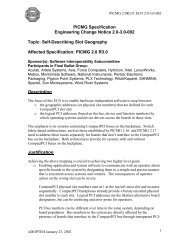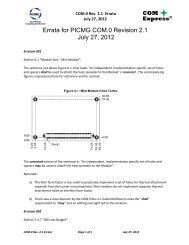PICMG 2.14, CompactPCI Multicomputing
PICMG 2.14, CompactPCI Multicomputing
PICMG 2.14, CompactPCI Multicomputing
You also want an ePaper? Increase the reach of your titles
YUMPU automatically turns print PDFs into web optimized ePapers that Google loves.
FOR INFORMATION ONLY;<br />
DO NOT ATTEMPT TO DESIGN FROM THIS DOCUMENT<br />
swappable entities and the MCNet system maintains associations between MCDevices and<br />
MultiComputing Nodes for purposes of dynamic configuration management and fault containment.<br />
MultiComputing Nodes<br />
MultiComputing Nodes (MCNode) are the entities that actually communicate using the <strong>2.14</strong><br />
protocol. An MCNode is the software abstraction that performs the protocol with a second<br />
MCNode. Each MCNode resides on an MCDevice. More than one MCNode may reside on a single<br />
MCDevice. Each MCNode is assumed to have a MultiComputing Node Interface (MCNI), which<br />
provides the abstract connection to the rest of the software running on an MCDevice. MCNet<br />
services are requested and received via the MCNI.<br />
There are two types of MCNodes. Each MCNet must have one and only one active System Node<br />
(SN). All other MCNodes participating in the MCNet are Peripheral Nodes (PN). Both Peripheral<br />
Nodes and System Nodes have an MCNI via which services are provided to associated software.<br />
Additionally, the System Node has a System Node Interface (SNI), which provides the abstract<br />
software definition of additional services required to manage the MCNet.<br />
Monikers and Moniker Assignments<br />
In the <strong>2.14</strong> protocol, every MCNode is known by a 64-bit value called a Moniker. The Monikers are<br />
similar to 64-bit Ethernet addresses. The complete MultiComputing specification describes the<br />
Moniker format in detail. Monikers are characterized as locally administered or globally<br />
administered, and, orthogonally, as individual or broadcast (multicast). An MCNode has an MCNetunique<br />
individual Moniker.<br />
Short Atomic Messages<br />
Short Atomic Messages (SAMs) are used to deal with the PCI bus mutual exclusion problem. While<br />
the PCI specification provides for bus locking mechanisms, bus locking is not widely or consistently<br />
implemented by PCI hardware. Therefore, the SAM mechanism is used in the one area requiring a<br />
shared resource.<br />
The System Map and Moniker Resolution<br />
One of the main functions of the System Node is to maintain a system map of all of the known<br />
MCNodes participating in the MCNet. The system map is built by the SN during initialization of<br />
PNs, which are created by the MCDevice discovery process and other processes. Each call to the<br />
sni_create_node function, and certain control messages within the MCNet, cause the SN to allocate<br />
table space for the new PN's system map entry.<br />
Broadcast and Multicast<br />
In this specification, the term Broadcast is used to represent both the true Broadcast, consisting of all<br />
MCNodes, and Multicast, which is an arbitrary subset of the MCNodes in voluntary association.<br />
True broadcast is used where the group consisting of all MCNodes is meant. Technically, there is no<br />
default true broadcast group, since all MCNet Broadcast Groups require that MCNodes explicitly<br />
join the group in order to receive data packets destined for a particular broadcast moniker.<br />
Since the physical layer characteristics of the PCI bus only allow for point to point communications,<br />
broadcast and multicast functions must be emulated. While broadcast operations are not strictly<br />
required for operation of the MCNet protocol, those functions are provided to ease the use of this<br />
protocol as a data link layer for other network protocols, many of which rely heavily upon broadcast<br />
capabilities.<br />
Emulation of the broadcast capability is provided by introducing an MCNode role called the<br />
Broadcast Group Broker, or simply, Broker. The Broker function is optional for all MCNodes<br />
<strong>PICMG</strong> <strong>2.14</strong> R 1.0 <strong>CompactPCI</strong> MultiComputing Short Form Specification, page 4



